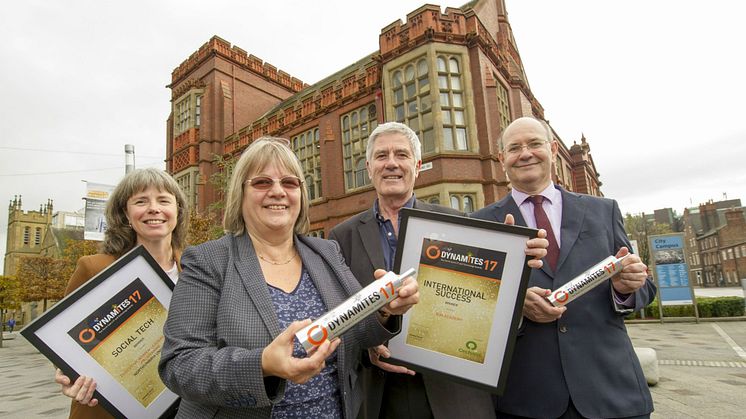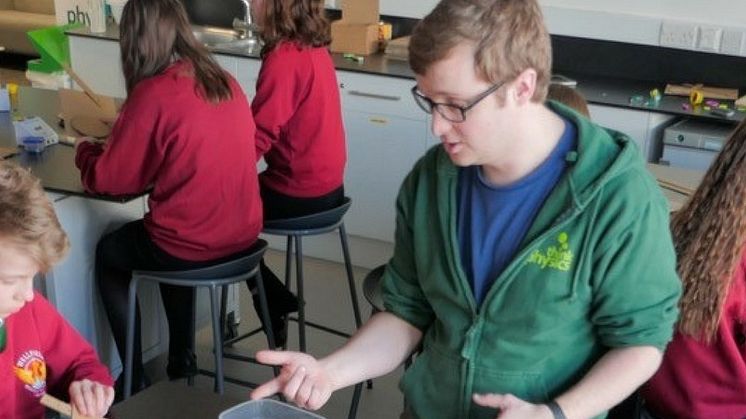
Press release -
Research provides insight into diffusive instability of particle flow
A Northumbria academic’s research into the impact that a magnetic field has on the movement of gases and liquids has been published in a world-renowned journal.
Mathematical physicist Dr Oleg Kirillov has spent the last seven years exploring the stability and instability of rotating flows of particles, such as those found in hurricanes, black holes or the rings around planets – for example, the dust and ice particles that make up the rings around Saturn.
These flows are often known as ‘Keplerian’ because the orbital motion of the particles obeys Kepler's laws of planetary motion – the scientific laws describing the motion of planets around the sun.
Dr Kirillov, a Vice-Chancellor’s Senior Research Fellow at Northumbria, has explored the impact a magnetic field, such as that found around planets, stars and galaxies, has on the flow of electrically charged particles. In particular, he looked at the difference it made when the material rotating was either a good or a poor conductor of electricity.
His findings have been featured in the prestigious Proceedings of the Royal Society A – The Royal Society’s research journal for Mathematical, Physical and Engineering Sciences and could have real world impact in a broader variety of areas. For example, it could allow meteorologists to more accurately predict the formation of cyclones by better understanding the stability or instability of jet streams.
Dr Kirillov’s work in part builds on research carried out by the physicist and Nobel prize winner Lord Rayleigh, the results of which were coincidentally published in the same journal 100 years ago.
Dr Kirillov said: “In astrophysics, almost every celestial body has a magnetic field, and this can affect the ionised matter around it, meaning it can change the direction and speed the matter moves at. This process occurs in industry as well as nature, with a magnetic field often used to control the flow of liquid metal when casting for example.
“It is quite natural therefore to mimic the movement of electrically charged particles around a star or planet in experiments with a rotating flow of a liquid metal.
“My academic colleagues in Germany conduct such experiments in order to find magnetic fields that would make turbulent the otherwise stable Keplerian flows, as was already predicted by Lord Rayleigh.
“In my work, I have developed a theory helping to specify such magnetic fields without expensive numerical calculations. My latest research investigates the subtle role that a competition between the losses of energy, due to electrical resistivity and viscosity of the flow, plays in finding the correct parameters of the destabilising magnetic field.
“It turned out that a singular surface known as the ‘Whitney umbrella’ governs the right choice of the parameters and can guide both the experimental and numerical research no matter whether the material of the rotating flow is a poor or good conductor of electricity.”
Following the publication of his work, Dr Kirillov plans to continue his collaborations with academic colleagues in France and Germany to research the phenomenon further, using a variety of different liquids. The results of his work could both facilitate the design of new experiments and allow their correct interpretation in the astrophysical context.
Dr Kirillov’s paper can be read online at http://rspa.royalsocietypublishing.org/content/473/2205/20170344
Find out more about Northumbria’s Department of Mathematics, Physics and Electrical Engineering, including courses available, by visiting https://www.northumbria.ac.uk/about-us/academic-departments/mathematics-physics-and-electrical-engineering/
Topics
Categories
Northumbria is a research-rich, business-focused, professional university with a global reputation for academic excellence. To find out more about our courses go to www.northumbria.ac.uk
If you have a media enquiry please contact our Media and Communications team at media.communications@northumbria.ac.uk or call 0191 227 4604.











